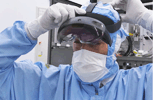COVID-19
Jewish General uses HoloLens for infection control
July 22, 2020
 MONTREAL – In an effort to protect healthcare workers against the risk of exposure to COVID-19 from infected patients, the Jewish General Hospital (JGH) is one of the first healthcare institutions in North America to experiment in real time with mixed reality headsets to minimize direct contact between staff and patients.
MONTREAL – In an effort to protect healthcare workers against the risk of exposure to COVID-19 from infected patients, the Jewish General Hospital (JGH) is one of the first healthcare institutions in North America to experiment in real time with mixed reality headsets to minimize direct contact between staff and patients.
By using Microsoft HoloLens, an untethered mixed-reality device with apps and solutions that enhance collaboration, practitioners are better equipped to provide the best personalized care at a time when physical proximity presents an imminent danger.
“With a single person in the hospital room, we can secure the information we need about a patient’s condition while minimizing the risk of the spread of infection,” explained Dr. Lawrence Rudski, chief of cardiology and director of the Azrieli Heart Centre at the JGH, who is spearheading this trial.
“With HoloLens and the Dynamics 365 Remote Assist app, we are able to limit contact and enhance consultation at the same time,” said Dr. Rudski. “A physician or other healthcare professional dons PPE and a HoloLens and enters the patient room, while colleagues view the images and consult from a safe locale elsewhere in the hospital. If necessary, we can then rapidly bring resources and expertise, both medical and specialized nursing to the bedside.”
HoloLens uses cloud and artificial intelligence (AI) services, including Dynamics 365 Remote Assist and Microsoft Teams to send a highly secure, live video-feed to a computer screen in a nearby room.
This allows healthcare teams to see everything the doctor treating COVID-19 patients can see, while they remain at a safe distance. Those watching can interact with the individual wearing the HoloLens by uploading charts and X-rays into the field of view and even draw on or point out at eye level a place on the patient’s body where a procedure is to be performed or a treatment administered.
It also allows for dictation of voice to text and hand gestures to operate its internal computing capabilities so forms and charts may be completed in real time.
HoloLens provides a comfortable and immersive mixed-reality experience that is preferable to smart phones or other devices because of its reliability, security, and powerful computing applications. It is also hands-free, thus allowing the person who is with the patient to perform a variety of tasks while remaining in constant contact with those outside.
“As the first hospital in Quebec designated to treat coronavirus patients, we were compelled to adapt our operations to the reality of a large number of highly infectious individuals needing our care,” said Dr. Rudski, who also serves as the chief medical information officer for CIUSSS – West Central Montreal.
“We rapidly identified those technologies that could help us navigate this crisis, with an eye on how they would improve the care we provide our patients going forward. We formed a team of progressive leaders in the departments of Nursing, Critical Care, Surgery and Medicine to develop protocols for use and to work with HoloLens. We are confident that HoloLens will be a valuable tool for facilitating remote consultations between local physicians, nurses and specialists anywhere within our network, but also anywhere in the world for all manner of treatment scenarios.”
“In the short term,” he continued, “it enhances the safety and security of our healthcare professionals, while reducing our need for personal protective equipment.”
The JGH has run a series of successful HoloLens simulations involving COVID-19, palliative care and intensive care unit scenarios. The device has also been used to provide wound care to a patient, guided by a nurse specialized in the area.
“The next step,” adds Dr. Rudski, “is to have staff ready to use this technology across our CIUSSS in time for the anticipated second wave of the pandemic. Subsequently, our plan is for our clinicians to use HoloLens headsets to consult with colleagues within our CIUSSS and for us to provide our own expert consultation to other sites throughout Quebec and beyond.”
The JGH is testing the HoloLens in collaboration with Auger Groupe Conseil, a Trois Rivieres-based firm that has, for several years, acted as a partner for the development of advanced solutions with Microsoft Canada and Microsoft United States in the field of mixed reality and remote access to information.
Their experts in the field of AR-technology enhanced healthcare are working closely with management and clinicians at the JGH in the fight against COVID-19 and have formed a close team-based approach.
“Having the privilege of helping the medical team at the Jewish General Hospital to fight COVID-19 is an incredible opportunity for my team of mixed reality experts,” said Marcel Lafontaine, P.Eng, the CEO of Auger Groupe Conseil. “By working to integrate innovative Microsoft tools to minimize the risk of contamination and optimize the treatment of patients, we are, together, advancing science.”
Kevin Peesker, president of Microsoft Canada, said, “I am pleased to see the incredible work the Jewish General Hospital and Auger Groupe Conseil is doing with Microsoft HoloLens and Dynamics 365 Remote Assist to help keep patients and healthcare workers safe.” Peesker added, “I’m heartened by the innovative solutions that Canadian researchers and healthcare providers are developing – at record speed – to help in addressing the pandemic. These innovations, made possible by the power of the cloud, will positively impact the delivery of patient care far beyond COVID-19.”
